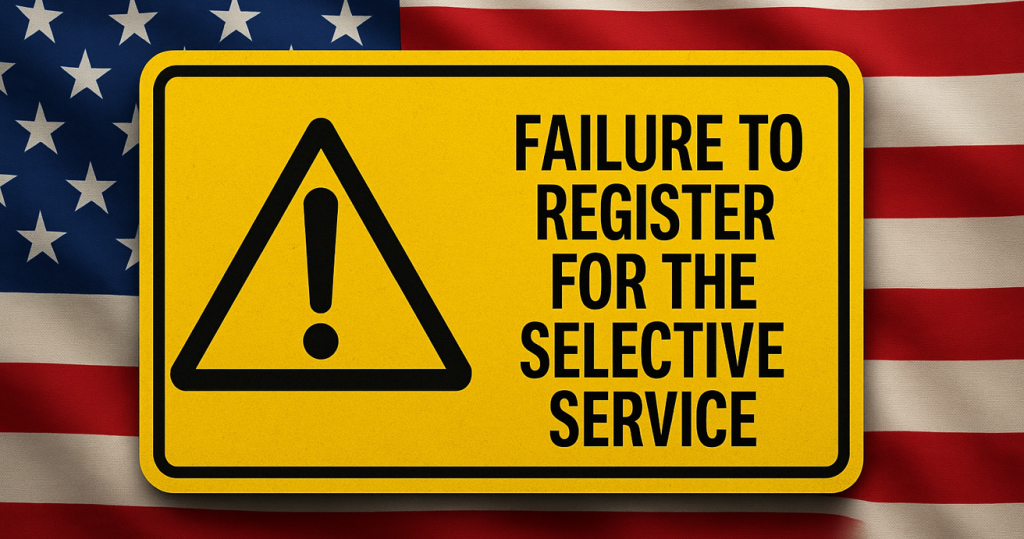How to Deal with Failure to Register for the Selective Service System
If you have failed to register for the Selective Service System, also known as the Draft, you need to understand the consequences and options for men over 26 years old.

Failure to Register for the Selective Service Draft
Under federal law, failure to register for the Selective Service can lead to serious, lifelong consequences. Many men only discover the problem after being denied a job, government benefits, federal employment, or citizenship. This blog explains why Selective Service registration is required, the penalties for failing to register, how it affects immigration status, what defenses may apply, and how to fight back. If you’re dealing with the fallout of a missed registration, LEWIS & DICKSTEIN, P.L.L.C. can help you build a path forward.
What Is the Selective Service and Who Must Register?
Federal law requires nearly all male U.S. citizens and immigrants ages 18 through 25 to register with the Selective Service System. Registration must occur within 30 days of a man’s 18th birthday. Late registration remains valid up to the 26th birthday. Selective Service registration is not military enlistment. It creates a list of eligible men in case Congress reinstates a draft during a national emergency.
In Michigan, the Secretary of State offers automatic registration during the driver’s license application process. The state also provides written warnings about the penalties for failing to register.
What Happens If You Fail to Register for the Selective Service?
Failure to register for the Selective Service is a federal felony offense. The maximum penalty is a $250,000 fine and five (5) years in prison. Although prosecutions are rare, the law remains enforceable.
Federal agencies treat failure to register as a serious issue. Men who miss the deadline may lose access to:
- Federal employment opportunities
- Security clearances
- Federal job training programs (such as those under the Workforce Innovation and Opportunity Act)
- Financial aid and scholarships
- Public employment at the state or local level
Agencies and employers routinely verify Selective Service registration. A missing record usually leads to denial unless you can prove your failure was not knowing or willful.

Immigration Consequences for Non-Citizens
If you are not a U.S. citizen and failed to register, the immigration consequences can be severe. Immigration law requires applicants for U.S. citizenship to show good moral character. If the United States Citizenship and Immigration Services finds that you failed to register for the Selective Service knowingly and willfully, the government may deny your naturalization.
USCIS closely reviews the circumstances:
United States Citizenship and Immigration Services can be unforgiving toward non-U.S. citizens who are required to register for the Selective Service but fail to do so. Failing to register is considered a moral character flaw and will impact an application for lawful status or a green card.
- Applicants between the ages of 26 and 30 must explain their failure and show it wasn’t intentional.
- After age 31, USCIS usually considers the issue outside the statutory five-year moral character period.
A strong, honest explanation and supporting documents can protect your application, but you should never attempt to complete an explanation without the assistance of competent legal representation. You only get one chance to apply for a waiver, and there is no “second bite at the apple” if your petition is denied.
Who Is Exempt from Registering?
Some men are not required to register for the Selective Service. Common exemptions include:
- Men who lived outside the U.S. between the ages of 18 and 25
- Non-immigrants (on valid visas) for that entire period
- Active-duty military members
- Incarcerated or institutionalized men during those years
- Men born before 1960
You must prove that one of these exemptions applies to you.
What If You Should Have Registered but Did Not?
If you should have registered but did not do so before your 26th birthday, all is not lost. You can still fight for a waiver or exception if you can prove by a preponderance of the evidence that your failure was not knowing or willful. This defense applies when:
- You didn’t know about the requirement
- You believed you had registered
- You relied on incorrect information
- You faced hardship, illness, or unstable housing
You must prepare a thorough explanation supported by evidence. Include details about your living situation, education, legal status, or anything else that shows your failure wasn’t intentional. It is vital that you file a petition for a waiver with the assistance of experienced counsel. You will not get a second chance if your petition is denied because it was defective or unpersuasive.

How to Fix the Problem: Status Information Letters and Waivers
The first step in addressing a failure to register for the Selective Service is to request a Status Information Letter (SIL) from the Selective Service System. This letter states whether registration was required and whether you complied.
Once you receive the SIL, submit it with a detailed written statement explaining why you didn’t register. Support your statement with documents, affidavits, or records that show your circumstances at the time.
Different agencies handle waivers differently:
- For federal employment, send the SIL and statement to the agency’s HR department
- For immigration, bring both to your USCIS interview
- For education or job training programs, submit them to the aid office or program administrator
Officials have discretion to grant waivers when they believe your failure was not intentional.
Michigan-Specific Issues
In Michigan, failing to register for the Selective Service can block access to:
- State-funded grants and scholarships
- State government employment
Michigan’s Secretary of State helps residents register during license and ID applications. If you applied for a license between the ages of 18 and 25, check whether the process included registration. If not, your defense may still be valid depending on what you were told or understood at the time.

Why Experienced and Effective Legal Counsel Matters
The consequences of failure to register for the Selective Service are too serious to handle alone. Many men only discover the problem when a job, benefit, or immigration status is denied. A strong legal case can restore your eligibility even if you missed the deadline years ago.
At LEWIS & DICKSTEIN, P.L.L.C., we help clients explain their situation and fight for waivers. We draft compelling written statements, organize strong supporting documentation, and communicate directly with government agencies. Our legal team understands how to present your case in the best possible light.
You don’t need to navigate this challenge alone! Let our experienced attorneys help you request a Status Information Letter, prepare a waiver package, and advocate for your eligibility. We have helped many others successfully overcome this obstacle. Contact LEWIS & DICKSTEIN, P.L.L.C. today for a confidential, free consultation. Let us help you fix this and move forward with your life.
Call us today at (248) 263-6800 for a free consultation or complete an online Request for Assistance Form. We will contact you promptly and find a way to help you.












